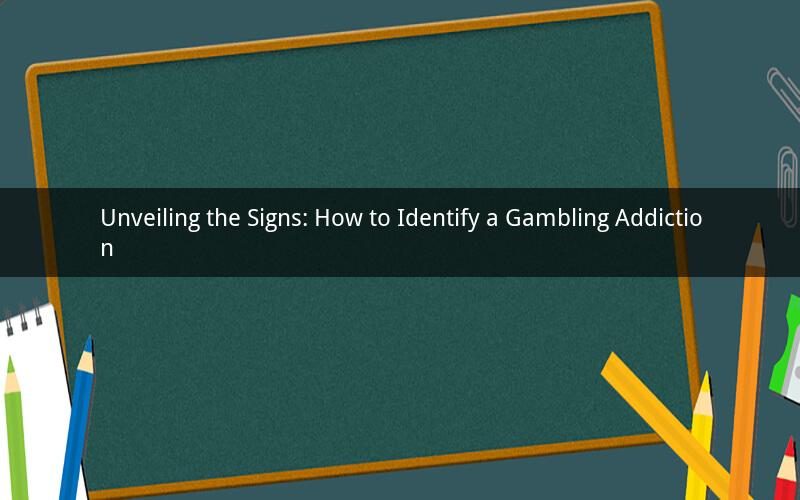
Introduction:
Gambling addiction, also known as problem gambling, is a serious condition that affects individuals, families, and communities. Identifying whether someone has a gambling addiction is crucial for seeking help and taking necessary steps towards recovery. In this article, we will explore the signs and symptoms that indicate a potential gambling addiction, providing you with valuable insights to recognize this issue.
1. Uncontrollable urge to gamble:
One of the primary signs of a gambling addiction is an overwhelming urge to gamble, even when it causes significant problems in one's life. This uncontrollable desire often leads individuals to prioritize gambling over other responsibilities, relationships, and personal well-being.
2. Financial difficulties:
Gambling addiction often results in severe financial consequences. Individuals may experience frequent financial strain, accumulating debt, and facing financial emergencies. They may also find themselves borrowing money, selling valuable possessions, or engaging in illegal activities to fund their gambling habits.
3. Time spent on gambling:
A gambling addiction can consume a significant amount of time, often at the expense of other important aspects of life. Individuals may spend excessive hours gambling, neglecting work, family, and social responsibilities. This preoccupation with gambling can lead to a decline in productivity and strained relationships.
4. Emotional and psychological symptoms:
Gambling addiction can have a profound impact on an individual's emotional and psychological well-being. Common symptoms include feelings of guilt, shame, anxiety, depression, and mood swings. These emotional disturbances can further exacerbate the addiction and hinder the individual's ability to seek help.
5. Relationship problems:
Gambling addiction can strain relationships with family, friends, and loved ones. Individuals may lie, steal, or manipulate others to support their gambling habits. The addiction can lead to conflicts, trust issues, and even the breakdown of relationships.
6. Physical health issues:
Gambling addiction can also have detrimental effects on an individual's physical health. Stress, sleep deprivation, and neglect of personal hygiene are common consequences. Additionally, individuals with a gambling addiction may engage in risky behaviors, such as driving under the influence or engaging in unsafe sexual practices.
7. Denial and rationalization:
Individuals with a gambling addiction often exhibit denial and rationalization. They may downplay the severity of their problem, blaming others for their financial difficulties, or justifying their gambling behavior. This denial can hinder their ability to seek help and hinder the progress of recovery.
8. Attempts to stop gambling:
Many individuals with a gambling addiction have made unsuccessful attempts to stop or control their gambling behavior. They may experience intense cravings, withdrawal symptoms, or a sense of loss when they try to quit. This indicates a strong addiction and the need for professional help.
9. Impact on work and education:
Gambling addiction can significantly impact an individual's work and educational performance. It may lead to decreased productivity, absences, and poor academic results. The addiction can also disrupt career opportunities and hinder personal growth.
10. Seeking help:
Recognizing the signs of a gambling addiction is the first step towards seeking help. It is essential to reach out to professionals, support groups, or treatment centers specialized in gambling addiction. Treatment options may include therapy, counseling, support groups, and in some cases, medication.
Frequently Asked Questions:
1. How can I determine if my loved one has a gambling addiction?
If your loved one exhibits signs such as excessive gambling, financial difficulties, neglecting responsibilities, and strained relationships, it is advisable to seek professional help to assess the situation.
2. Can a gambling addiction be cured?
While there is no quick fix for a gambling addiction, it can be effectively treated and managed. With proper support and treatment, individuals can overcome their addiction and lead a healthier, more fulfilling life.
3. Is it possible to recover from a gambling addiction without professional help?
While seeking professional help is highly recommended, individuals can also benefit from self-help resources, support groups, and therapy. However, professional guidance can provide a more structured and comprehensive approach to recovery.
4. How long does it take to recover from a gambling addiction?
The duration of recovery varies for each individual. Some may experience immediate improvements, while others may require ongoing treatment and support for several years. Recovery is a continuous process that requires commitment and dedication.
5. Can a gambling addiction affect my children?
Yes, a gambling addiction can have a significant impact on children. It may lead to emotional distress, behavioral problems, and a higher risk of developing their own gambling issues. Providing a supportive and understanding environment is crucial for children affected by a gambling addiction.
Conclusion:
Identifying a gambling addiction is crucial for taking the necessary steps towards recovery. By recognizing the signs and symptoms, individuals can seek help and embark on a journey towards a healthier and more fulfilling life. Remember, seeking professional help is the first step in overcoming a gambling addiction, and there is hope for a brighter future.